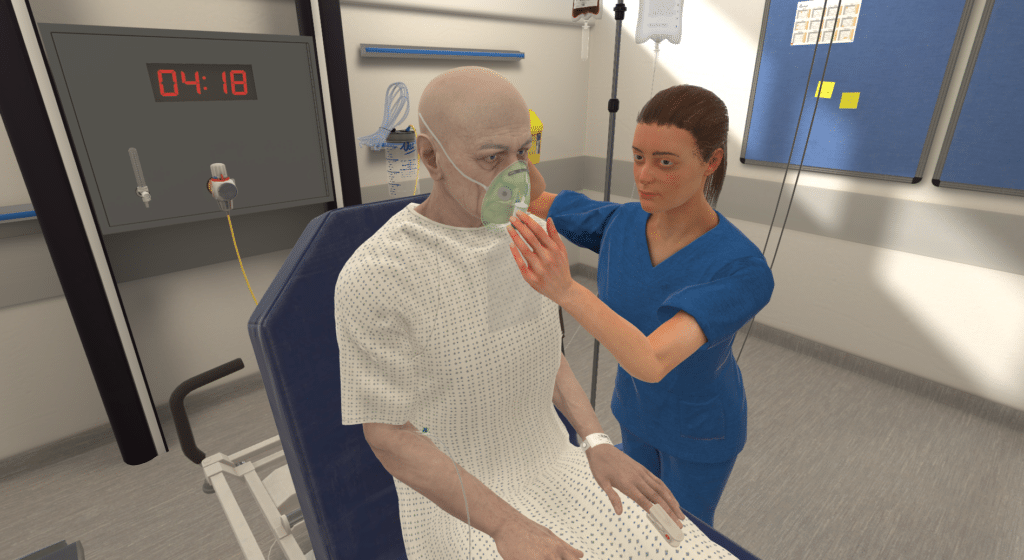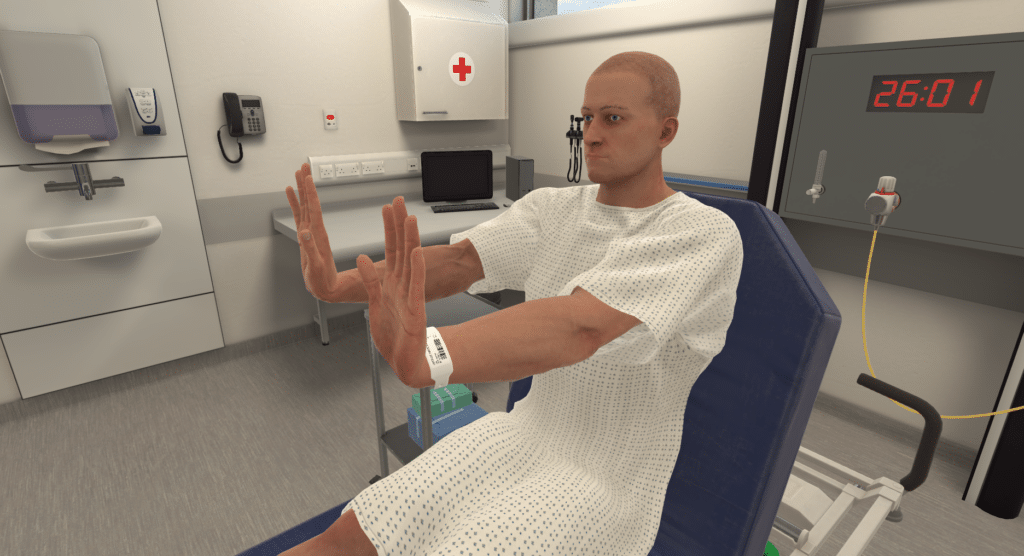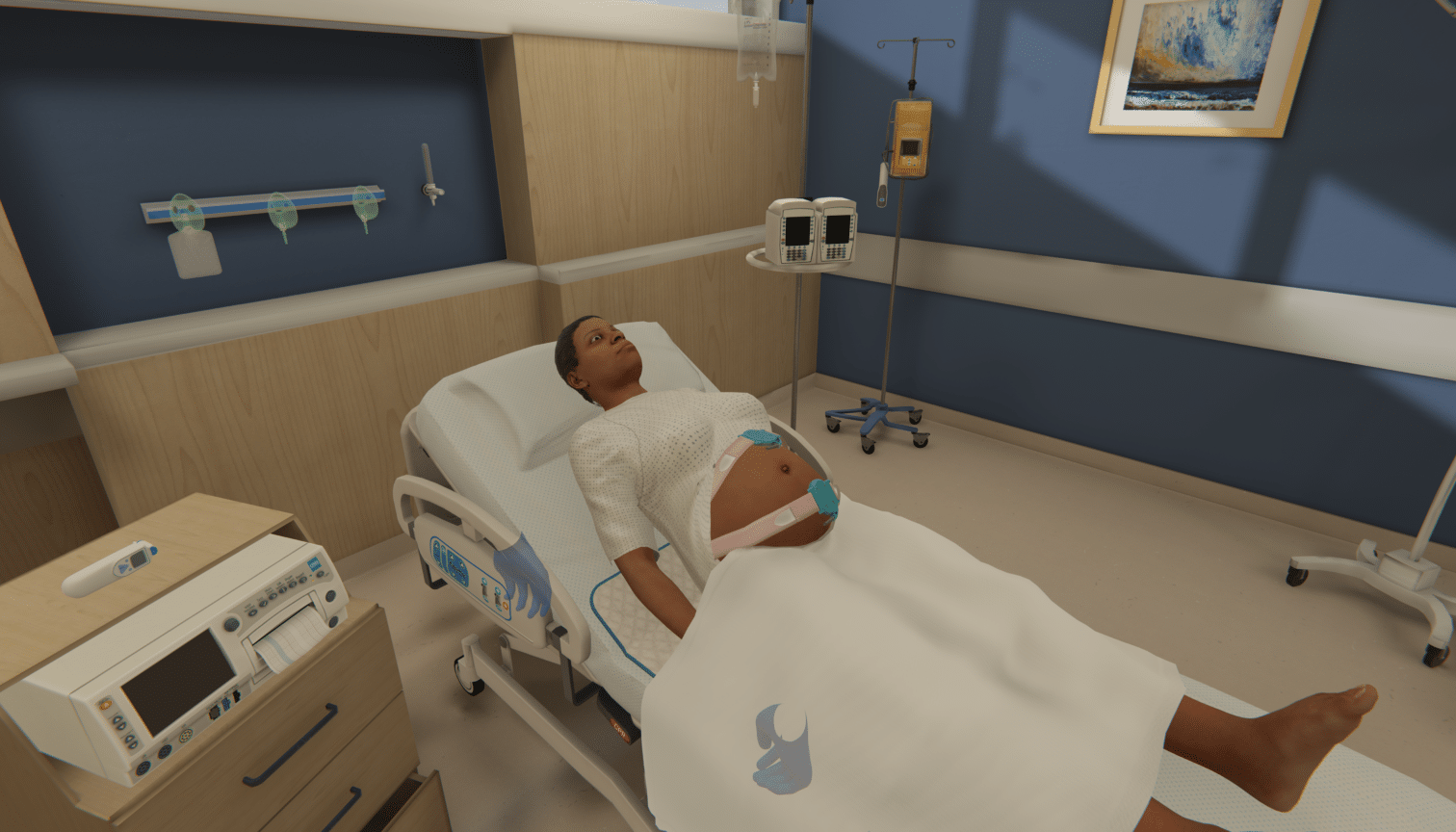Nightingale College, a leader in leveraging technology to optimize nursing education, offers remote distance education for their learners, improving equitable access to quality nursing education regardless of geographic location.
To apply their skills, learners obtain supervised on-ground field experiences through the wide network of Nightingale’s clinical partners across the country. Many of these facilities contracted with Nightingale to provide space to house skills and simulation laboratories.
To expand their learners’ access to simulation experiences, Nightingale began exploring the use of virtual reality (VR) for immersive learning reflecting real-life clinical scenarios.
They sought a VR partner that could work with them to effectively deliver equitable access to virtual simulation remotely and achieve a longer-term goal – implementing VR simulation into an existing curriculum.
During the course of COVID-19 in 2020, there was widespread concern across the United States over the loss of clinical placements, impacting the trajectory of learners’ education. As a result, the plans for VR use within Nightingale’s curriculum were accelerated.
Nightingale College enlisted the help of Oxford Medical Simulation (OMS) to provide their learners with access to evidence-based clinical scenarios remotely.
The initial rollout
Nightingale College rolled out the initial set of screen based simulations to learners in order to accommodate learners’ immediate needs while continuing to meet key learning objectives.
Juliet Kolde, VP of Nightingale Innovations, noted one reason OMS stood out in their search for a VR partner was the inherent ability for learners to access simulations independently, decreasing the need for faculty to oversee the scenarios each time and instead focusing on learner debriefing activities to help facilitate transfer of knowledge.
Because of learners’ varying locations and the introduction of VR at scale, Nightingale College faced a unique challenge in onboarding large groups of learners at a distance.
To assist in their implementation, the Support and Success teams at OMS created custom content that included materials with information on OMS, VR use, and pre-briefing and debriefing with VR simulation.
Throughout their implementation of VR, Nightingale College collected data on the usability and impact of simulations on learners’ competencies.

Nightingale's results
In Spring 2020, learners were exclusively in-person for simulation. In Summer 2020, after one semester of on-screen simulation, Nightingale College saw that their learners’ total mean outcome scores of the HESI exam increased by 74 points.
As learners demonstrated marked improvement in assessment scores, Nightingale College took another step forward by adding on immersive VR in addition to on-screen simulations. The College worked with OMS to map scenarios to the curriculum in order to address specific key learning objectives for clinical-based courses.
With their use of VR growing, Nightingale College started providing each new learner with a VR headset on their first day as a part of their welcome package. Learners then had access to fully immersive VR simulations at home, with the option to utilize on-screen scenarios as needed.
The promising results from their study continued to show into the Fall of 2021 as learners began using both VR and on-screen simulations. Specifically, the College found significant improvements in the metrics of critical thinking and clinical judgment competencies when compared to pre-pilot scores.
According to Kolde, learners appreciated the asynchronous nature and repeatability of scenarios prior to engaging in a synchronous debriefing session with faculty.

Looking ahead
Following the pilot, Nightingale College has continued its work in implementing VR simulation into its courses, now running over 20,000 scenarios per semester.
They are one of the first to take the leap of providing VR headsets to every learner at home, increasing equitable access to simulation-based education for learners, whether they reside in a city, town, or rural area.
Because of their move to remote VR simulations, Nightingale College is no longer reliant on physical facilities for simulation experiences.
Looking ahead, Nightingale College plans to continue its use of VR simulation in addition to in-person clinical experiences for optimal learning outcomes.
Key findings and takeaways
Delivering VR simulation effectively – at scale
Nightingale College remains at the forefront of leveraging technology to accommodate learners from across the nation no matter their geographic location, widening availability and access to quality healthcare education and training.
Nightingale College found a VR partner to address both its immediate need for asynchronous simulation in 2020 and the College’s long-term goal of incorporating VR simulation into the curriculum.
Through their use of virtual simulation, Nightingale was able to meet the needs of learners while continuing to support their educational journeys and maintain clinical simulations.
The Support and Success teams at OMS collaborated with Nightingale College to develop resources and materials to make it all happen for faculty and learners, at scale.
The Support team also blocked hours for one-on-one appointments in which learners or faculty could pop in and know they always had someone to help them troubleshoot or answer questions.
Not only did Nightingale effectively onboard large groups of learners at a distance, they also found significant positive outcomes as a result of their use of VR simulation for clinical education.
Kolde praised the teams’ time-to-resolution with any troubleshooting and their consistent preparedness throughout the onboarding and maintenance processes.
The compassionate and knowledgeable support and success teams at OMS consistently go above and beyond to ensure exceptional experiences with VR simulations, and when asked about what she likes best about working with OMS, Juliet Kolde simply stated “the people”.
To learn more about implementing VR at scale, set up a time to speak with an Educational Specialist.

